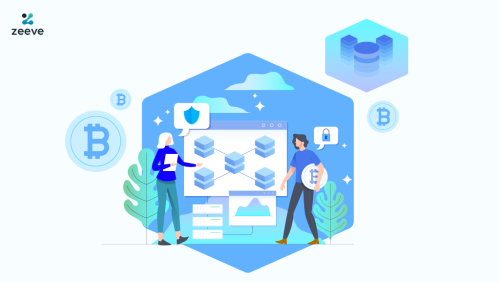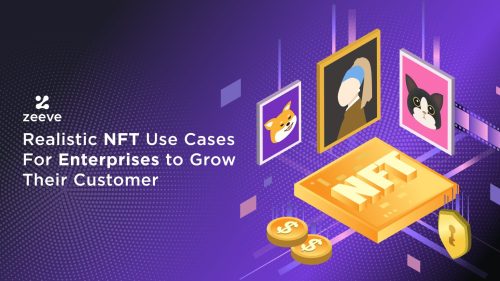
Comprehensive Guide On Blockchain As A Service
Today, the advanced pace of technological innovation has brought in revolutionary changes across industries, and it will not be completely untrue to name it as by far the most astonishing period in history of technological innovations. The pace of technological advancement has forced residents and visitors to an ever-nearing edge on technology, humanizing it even more often.
Consider the blockchain infrastructures and cloud-based deployments when developing innovative solutions for your IT challenges. These business models are not intended to solve all organizational problems, but they have a demonstrated track record of success in addressing technical challenges related to IT.
Blockchain technology has been gaining immense popularity in the world of business as a way to automate and streamline transactions. Blockchain infrastructure makes it easy for businesses to access and use the disruptive technology without relying heavily on any third party or some other authority to build or preserve the network themselves. There are several BaaS providers available, with different capabilities and pricing models. Some popular providers include IBM, Microsoft, and Amazon Web Services.
The ways in which the blockchain services are being offered is no surprise, yet while many firms are still working through the aspects in dealing with distributed ledgers, a number of corporations, startup technology firms, and additionally, firms open to innovation, are already buckling up their belt to back up blockchain infrastructure to ease the adoption process. Rendering blockchain as a service is a well-timed move for the companies concerned.
What is Blockchain as a Service (BaaS)?
BaaS is a type of blockchain service that provides cloud-based services to businesses which They can utilize for the development of their own blockchain-based applications, smart contracts, and other services on the blockchain. The duties and responsibilities pertaining to the maintenance and smooth running of the infrastructure are looked after by the cloud-based services partner or service provider.
In the block-chain-as-a-service (BaaS) model, business firms and companies can utilize Blockchain services that have been generated and formulated in the cloud. A blockchain-as-a-service application has been formed, hosted, and arranged in the cloud. This particular application works just like a regular software-based blockchain that has smart contracts in addition to other tools.
Blockchain as a Service is a critical event in establishing the field of the blockchain, which holds the potential to expedite the mass implementation of distributed ledger technology across industries. Blockchain technology’s model can be seen as similar to that of Software as a Service (SaaS). A blockchain as a service (BaaS) model application has the benefit of a structure-less business. The business doesn’t have to focus on the setup and management of a server but instead can simply rely on the provider of the cloud-based service for these jobs.
Importance for Blockchain as a Service (BaaS) for organizations
Blockchain technology has gained a lot of exposure, and it’s being talked about without exception in almost any industry worldwide. It seems to be a perfect fit to any industry, as its core competency lies in areas like business, energy, healthcare, power, finance and so on. It’s a challenge for certain industries that have strongly ingrained blockchain in their core competencies, but the business itself is a great task.
In general, many industries had persistently struggled with the technical intricacies of designing and maintaining Blockchain and any of its related infrastructures, but this had been remedied by the arrival of Blockchain as a service (BaaS) model, allowing organizations to face these complexities and adopt notice and take advantage of Blockchain in their spaces.
Companies in various industries are finding that implementing blockchain could help them to streamline processes. However, the intricacy of the underlying technology, the need for beginner talent, and significant operational expenses involved establishing and operating the Blockchain have become stumbling blocks to adoption. Key decision makers are often forced to go slowly on adopting digital ledger technology and infrastructure.
Hiring the services of a Blockchain as-a-Service provider will grant clients access to thorough experts in Blockchain development, the organizing and governance of business administration systems, plus the entire business cloud drive for setup and beginning.
A reputable BaaS associate is an outstanding source for means of making protection systems more efficient. It substantially reduces the number of hazards you would confront in the process of building them.
How Does the BaaS Model Work?
Just like how you manage your website by using daily tasks like registering a web host with Microsoft Azure or Amazon Web Services, a web site hosted on a Blockchain as a service (BaaS) provider can use whatever web hosting service the provider in question or the client chooses. The BaaS service provider administers the application, secures the back-end, monitors resources, and deals with any threats. It also keeps the infrastructure up and running at all times.
When a service provider signs up for a Blockchain as a Service contract with an IT partner, they execute an agreement that will specify when the IT partner will enable Blockchain infrastructure (to enable the company’s information system). The charges levied on the company takes into account the article specified in the contract agreement.
The blockchain as a service partner (BaaS) or vendor deploys the necessary resources to make use of the technology and infrastructure required by end-users and customers and organizes blockchain-based nodes to enable connected transactions.
The blockchain-based network created by the BaaS partner may be set up on any forms of distributed ledgers such as Ethereum, Bitcoin, R3 Corda, Hyperledger Fabric, Chain Core, Quorum, or BlockApps. Blockchain as Service users will have to cover the provider’s operations expenses when utilizing the platform for offering Blockchain-as-a-Service. .
Clients look to third parties to take new challenges, such as Blockchain management, into their own hands. BaaS contracts also involve backup and recovery services, in addition to bandwidth and resource management, event management, and system health monitoring.
Blockchain As a Service (BaaS) gives a company the option to focus on its core activities and rivalry approaches by outsourcing the Blockchain infrastructure and its performance. Over time, it empowers business managers to execute distributed-ledger workloads in environments where a flawless degree of fault tolerance is required.
Cost Comparison of Self-Hosted Blockchains vs BaaS Offering
Each model for determining a BaaS’s price varies, but in any case, a blockchain application hosted on the premises is more expensive than BaaS offered in the cloud.
In the model in use before this, the Initial Total Cost of Ownership (TCO) for a blockchain application was owing to the increased cost of start-up. There were costs pertaining to the deployment of expert personnel, infrastructure, hardware, software, licensing, consulting, etc. Additionally, there were also other operational expenses related to the monitoring, management, bandwidth costs, charges per transactions and also retirement fees as well as expenses related to the archiving, decommissioning of the server racks and so on.
It could cost as much as several hundred thousand US dollars to develop and implement one Blockchain smart contract within the model identified above. Meanwhile, users can engage in the purchase of a blockchain application created and hosted in the cloud as a part of an on-going blockchain as a service offering for as meager as $0.29 USD per identified CPU hour (IBM Blockchain Platform for IBM Cloud). It is also commonly referred to as a “pay as you go” pricing model, in that the customer is only billed for the units of service consumed by it. Hence, it is found that the BaaS as a service is much more affordable than the self-hosted blockchain.
However, the final price tag on these transactions differs based on additional factors, including, but not limited to, pricing alone. Several different dimensions have to be factored in, such as the number of transactions, the size, and maximum capacity of the payload on transactions.
Similarly, Amazon AWS Managed Blockchain service pricing is determined by factors such as network membership, peer nodes, peer node storage, data written to the network, and data transfer.
The charges related to the customer’s hourly network connection fee are billed against the selling job’s hourly rate, beginning at $1.93 USD per network member. Also included are the sales price per peer node, the sales price per storage device, and the amount billed for data writing.
Like its Azure Blockchain service, Microsoft has a multi-tiered pricing structure for its services. Each level contains a set of transactions, validator nodes, and GB storage provisioned to subscribers.
The primary cost that is associated with nearly all of the BaaS solutions is related to consuming the services. Of course, when choosing an external service provider to implement your IBM, AWS, or Azure Blockchain application, additional maintenance of help, solution development, and any other support service costs should also be taken into consideration if you have a service contract.
Ways to combat security concerns related to BaaS
For companies’ experiences using Blockchain to improve data security, the concept of keeping transactions in a publicly accessible ledger is a turnoff. That it becomes all the more crucial since stricter data regulations and protection laws are becoming more prevalent is an encouraging thing. The persuasive side of Blockchain’s benefits, however, is that this technology makes it simple to transfer legitimate data in a manner that is completed in a timely fashion.
Nonetheless, information security is not an inherent characteristic of DLT technology. The distributed ledger technology has a wide range of features, including the public key encryption, digital signatures, hashing, and several other methods to keep the data and communications secure and safe. Some of these techniques are weakened if not properly administered.
If blockchain complications or any other fundamental flaws develop on the website, it could bring about a complete shutdown and result in unpredictable outcomes. As a result, you should thoroughly study the reliability of the site before you sign up with them, so that you can completely understand the associated risks.
Before exploring the market with the necessities, the IT team should lay down the goals and expectations from the services, including maintenance and warranties that may have to be accepted in the future.
Relevant parameters for choosing a Blockchain as a Service Partner
There are different sets of rules and factors that businesses need to take into account when choosing a business vendor. And it can be all the more challenging and complex when the business has to focus on a BaaS provider since there are no formal guidelines and best practices in the industry. When assessing a particular BaaS company, it’s helpful to consider several broad principles. There are many Blockchain as a service provider companies in the marketplace. Here are a few tips on how to identify an excellent BaaS service, or you can say the prerequisites that a good Blockchain as a service provider needs to fulfill.
Integration of Smart Contracts
Smart contracts are not only effective when it comes to incorporating business logic into the application but can let users establish rules based on specific events, automate complex business processes, and on and so forth for a business that works with blockchain-as-a-service. For blockchain as a service, it’s crucial to allow users to incorporate smart contracts. To offer providers with blockchain-based smart contracts, it’s important for a provider to have a blockchain utilized as a resource.
Identity Management implementation
Insofar as facilitating security in the network is concerned, a blockchain platform should develop an access control mechanism for authenticating and validating users to ensure that all authorized users can access it. Regulating access on any network is generally not something recommended. An intuitive authentication system is mandatory to access permissions and rights on a blockchain network.
Diverse Frameworks
As the technology behind cryptocurrencies continues to develop, more and more businesses are looking into blockchain platforms as a way to improve efficiency and security. While there are many different blockchain frameworks available, two of the most popular are Ethereum and Hyperledger Fabric.
Ethereum was created in 2015 by Vitalik Buterin, who is now one of its most prominent developers. It is a platform that allows for users to create their own decentralized applications (dapps). These dapps can then be used by other people on the network, or they can be sold on the open market.
Hyperledger Fabric was created in 2015 by IBM and Intel as part of their shared vision of creating an open source platform for blockchain applications. It is similar to Ethereum in that it allows for users to create their own dapps, but it also includes features that make it more suitable for business use. Pick out a good blockchain as a service provider that can support multiple blockchain platform development and frameworks as part of their services. You can ensure a flexible and dynamic blockchain application by choosing a BaaS provider that allows several frameworks.
Backend Services
A blockchain service provider requires an array of back-end services because the requirements of every business are different. Each business requires highly specialized back-end services, such as high-quality security, cost-effectiveness, ease of scalability in the case of heavy traffic, continual availability of systems, balancing energy usage, and millions of other customizations.
High-speed Provisioning
A Blockchain as a Service provider is put under a lot of stress to host and deploy Blockchain apps due to the many hosting requests it receives from various sources. The hosting requirement can be made either by browsers or computers or the request for the deployment of Dapps can also come from databases and servers. Moreover, the requirements of each of the deployments are rather very unique and complex. For an enterprise, it’s a BaaS service provider to those who don’t need any special hardware since they have access to the convenience of a cloud-based solution. The most beneficial provider is the one that gives fast and hassle-free deployment of the software, large-scale production with minimal issue potential, and the capability to recover at the onset of unplanned shutdowns. Also important is the ability to ensure effective safety, even for complex operations.
Experienced blockchain deployment infrastructure provider
Always make sure the BaaS partner has experience developing and deploying Blockchain technology for similar requirements and on the level that you are committing to. If possible, ask if you had previous clients.
Commitment to Quality
Appropriate implementation and high-quality design are important to any process or software implementation. Blockchain is no different. Take the time to investigate the field of a vendor’s quality, process and customer service.
Security Assurance
It is critical to look for gaps in digital security in case of future implementation. To ensure a successful outcome, a small bug could potentially trigger company-wide problems. It is essential that you plan a pronounced outcome for the distributed ledgers later on.
Choice of Operating Systems
Check the vendor’s experience in establishing cloud-based solutions for the management of operating systems similar to the one used by your organization. You should also make sure the Blockchain infrastructure combines seamlessly with your legacy systems.
Ease of Use
Blockchain enabled systems and procedures need to be user friendly and easy to adopt for users. In any case, no company would want their employees to have a hard time trying to figure out the use of blockchain-enabled systems or to navigate through it. Complex systems can prove to be quite detrimental for the complete adoption rates and may lead to negative business results.
Pricing and Support
You’ve only had to pay based on the total value of the service provided to you by the BaaS provider after carefully evaluating it. Examine the prices and different Versions of activation and support before payment. You’ll get the greatest value for the cash if you pay for the option that supplies the greatest value to the business.
Pros and Cons of BaaS
A blockchain-as-a-service (BaaS) platform enables businesses to quickly and easily deploy blockchain technology. However, there are several pros and cons to consider before deciding to use a BaaS platform. Here are some key points to keep in mind: The benefits of using blockchain-as-a-service (BaaS) are vast. From streamlining transactional processes to providing a more secure and tamper-proof system, BaaS can have a profound impact on businesses of all sizes. However, there are also some pitfalls and challenges of implementing BaaS that should be taken into consideration when
Cost Savings
In most cases, businesses wish to go beyond cost savings when they venture to contract with an IT services provider. It depends too much on BaaS. Even so, the cost and execution advantage over anything else becomes too much to bear. Blockchain implementation, services, and maintenance to BaaS partner businesses usually look for the value beyond cost savings as they agree to contract with an IT service provider. Your business will thrive by outsourcing the tasks involved with blockchain implementation, operations and support to a business-as-a-service (BaaS) partner. Doing so will help you conserve energy and resources you would spend on searching for, recruiting, training, monitoring, compensating, and maintaining developers and IT staff. By including these costs to the venture’s budget, you are guaranteed to fail continuously.
Ease of Use
BaaS service providers frequently supply custom designs paired with an integration tool interface and ready-to-use modules that can be set up in a short time frame by users with working knowledge of computer programming. It really aids companies in eliminating the learning curve and resources required to conduct serious exploration into this phase. Companies can use ready-made platforms such as Blockchain as a Service for integration with existing systems and applications to build and deploy their own architecture.
Focus on Customization
Thanks to BaaS, companies can use ready-made platforms and TEMPLATES to develop their companies’ blockchain solutions. The role of the in-house development team is to understand their clients’ demands and design an app or a service that satisfies those needs. If the necessary blockchain substructure is put into place, the BaaS service vendor generally oversees it, typically with bandwidth management, resource allocation, hosting and security surveillance.
Staff and Resource Optimization
Inadequate on-premises IT infrastructure limits the physical overhead of air space, power, and cooling. This translates directly to reductions in staffing and fires, because the IT staff can now focus on their business instead of dealing with specialized demands. This allows employees to participate in the business’s most crucial and beneficial projects, contributing to its success.
Limited In-depth Knowledge
Blockchain is still a developing technology, and many corporations haven’t yet had much practice with how it worked. In such scenarios, implementation choices made with less than complete knowledge are at high risk of failing and wasting investment, and thus it is advisable to take things slowly, thoroughly preparing before moving ahead.
Lack of Visibility and Control
Usually in models of cloud-based autonomous systems, infrastructure, resources and the provider owns the technical know-how. It can result in the breakdown of the communication layers and a clear absence of the understanding of the real situation on the ground when technical problems arise. Critical events such as a service breakdown or external damage can result in the client and the provider entering into a situation in which they must depend on each other completely. Such situations may well cause mistrust between the two entities.
Data Compliance Challenges
Blockchain’s distributed-ledger technique distributes information across a worldwide network. Additionally, this tool enables the creation of dubious battlefields that defy prior law, especially when information shared is available on multiple servers and stores are situated in countries on specific sanctions lists.
Business Continuity
Unlike alternative dispute resolution procedures, most service contracts tend to assume that a service provider will be in business for many years, and is able to complement the business for as long as the contract states.
Due to the disruptive dynamic in today’s competitive business environment, it’s extremely hard to presume that the provider in question will be in business. This holds true for blockchains as well. If the company files for bankruptcy in the many years following the implementation of the blockchain or undergoes a merger with another business, the chances of service disruptions will increase manifold.
Gain a competitive advantage and help your organization become future-ready without expending significant resources through incorporating Blockchain technology as a Service solutions. It’s a great way for you to become a leader in your peer group as well as have the opportunity to provide leadership service to others in the industry.
An experienced BaaS partner can help you take your technological project to the next level by taking the appropriate precautions.
Zeeve is the primary Blockchain as a Service (BaaS) platform that supports businesses and blockchain start-ups to build, deploy and manage decentralized apps and blockchain networks. It serves as a low code automation platform that supports several blockchain protocols with cutting-edge analytics. It not only deploys and builds the networks but also monitors the nodes. Explore the dominant set of APIs to set up DApps for a series of use cases across several verticals. With an experienced and expert team of blockchain solutions providers, we support applications in all spaces. Get to know more in detail about the blockchain as a service offerings, nodes and smart contracts by calling us!





Responses